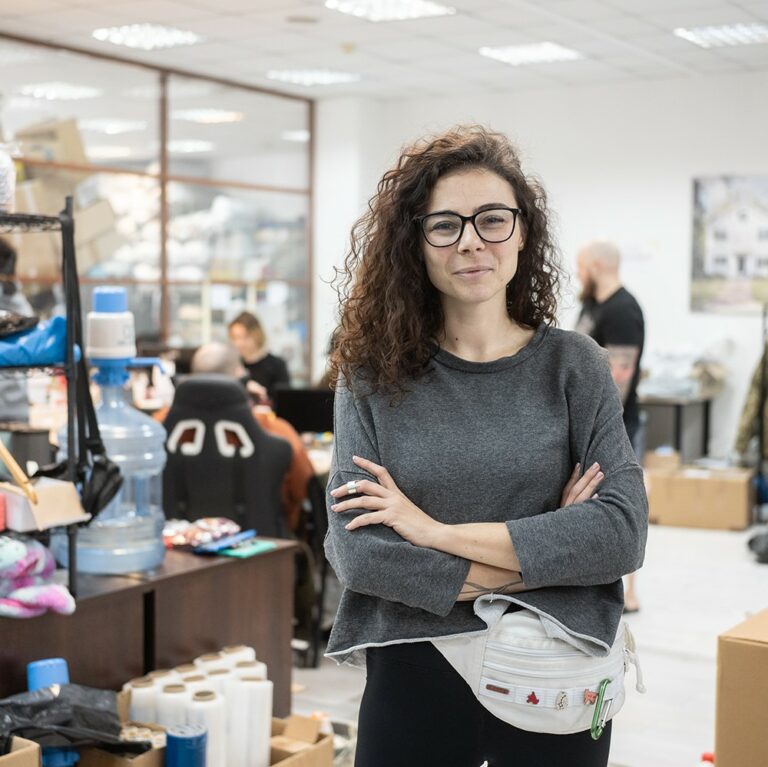The regions affected by the full-scale war now face food shortages and limited access to essential services. Female volunteers quickly organized assistance for their communities, ensuring that they had access to basic necessities such as food, water, and medicine. Zgraya (from Ukrainian means “flock”) is one such volunteer organization headed by Yevhenia Talinovska.
Zgraya is one of Ukraine’s largest volunteer initiatives, with headquarters in Kyiv. It was founded in 2014 during the Revolution of Dignity. Volunteers don’t work constantly, but when the need arises, they quickly gather in order to help people in different regions. Members of Zgraya initially assisted on Euromaidan, and when the Russian-Ukrainian war began, they helped equip defenders staitioned on the east of the country.
The volunteer organization has grown significantly since February 24, 2022. Every day, 2–3 trucks carrying tens of tons of humanitarian aid (food, medicine, diapers, sleeping bags, etc.) arrive at Zgraya’s warehouses. Around 3,000 people help the organization, including 30–40 key coordinators, nearly 2,000 volunteers on the ground, and over 400 drivers. Volunteers provide medicine, meal kits, and transportation to civilians.

In peaceful life, Yevhenia Talinovska, the co-founder of Zgraya, works as a graphic designer in an IT company and is the coordinator of fundraising projects for the charity foundation “Everybody Can”. She was in Kyiv on the first day of the full-scale war when she heard the sounds of explosions. Instead of fleeing the country, the woman decided to stay and start volunteering on the very first day.
— We defend what’s our – our land, people, and truth.
Zgraya has several main areas of work that include providing equipment for the Armed Forces of Ukraine, delivering humanitarian aid to civilians and evacuating them. In cooperation with 15 restaurants in Kyiv, volunteers deliver cooked meals to checkpoints, shelters, hospitals, and nursing homes. They also work with dozens of Kyiv hospitals, delivering equipment and medicine.
— This is a well-organized group that can quickly form a functioning mechanism. We gather for specific requests, carry them out, and then disappear when we are no longer needed.

Following the liberation of Ukraine’s northern regions from Russian occupation, Zgraya focused on delivering humanitarian aid to small villages far from Kyiv that receive less attention. Yevhenia Talinovska visits the liberated settlements as well. Yevhenia says that she is mentally prepared for the horrors of “Russian world” in Ukraine because she saw them eight years ago in the villages and towns in the east of the country. She states that the war has been ongoing since 2014, but it has become geographically closer to many with the beginning of the full-scale invasion.
— When I see this, I just want to find money, buy, bring, solve, help, and only then reflect.

Yevhenia recalls how difficult it was to raise funds when she first began doing charity work in 2008. At the time, Ukraine still had a developing fundraising culture, and people did not fully understand how charitable foundations functioned and where their money was spent on. The situation changed after the Revolution of Dignity:
— The volunteer movement after Maidan is probably one of our greatest achievements. Society has changed a lot. A culture of volunteering emerged, as did a slew of cool initiatives. People finally realized that it is possible to help and that it is not necessary to transfer all responsibility to the state.

Zgraya is constantly looking for partners who can help with the necessary things for civilians and the military. They also accept charitable donations to help fund their volunteer project.



